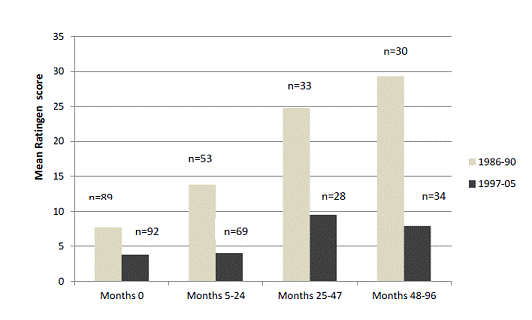Session Information
Session Type: Abstract Submissions (ACR)
Background/Purpose: To compare the rate of radiological progression in patients with rheumatoid arthritis (RA) diagnosed in the 1980s with those of the late 1990s until 2005 and to evaluate key factors for differences in prognosis.
Methods: 92 RA patients which were firstly seen in our clinic from 1997 to 2005 and in which baseline and at least one follow up radiograph of hands and feet were available were retrospectively identified. As a control group, 89 RA patients from 1986 to 1990 were matched for the criteria disease duration, age and number of x-ray controls. In both groups patients had a disease duration of less than 5 years at first consultation (mean: 22 ±17 months). Radiologic damage was measured by the Ratingen score (RS).
Results: The baseline RS was significantly lower in the 1997-2005 group compared to the 1986-1990 group (mean 3.8 ±8.7 vs. 7.7 ±13.0 respectively, p<0.0001). This was also the case in the patients firstly seen before the approval of TNF-Inhibitors in 2000 (n=29, mean baseline RS 1997-2000: 2.7 ±4.9; p<0.001 in comparison to 1986-1990). Moreover, the 1997-2005 group showed significantly less radiologic progression than the 1986-1990 group during follow-up (ΔRS/year of 0.95 ±2.19 vs. 5.69 ±8.43; p<0.0001). In the later group more patients (73% vs. 28%; p=0.0001) received methotrexate (MTX), mainly early in the course of the disease. In contrast, the overall rate of DMARD treatment was not significantly different in both groups. Twenty one (23%) of the patients in the later group received biologic drugs, in the majority TNF-Inhibitors. Multivariate analysis showed that early start of MTX (before or directly after first consultation) was a significant predictor of low radiographic progression (p<0.005), as were low ESR at baseline and belonging to the later group. In contrast, neither treatment with glucocorticoids or biologic drugs nor the overall rate of MTX-use were predictive for a better outcome.
Conclusion: Radiologic damage is markedly diminished in RA patients seen since the late 1990s. Early treatment with MTX may be the key factor for this improved prognosis. However, due to the retrospective design of the study, a bias cannot be completely excluded.
Fig: Mean Ratingen scores and radiologic progression in the different groups 1986-90 and 1997-2005 (grey and black). The results of the x-ray analysis were separated in dependence from the time after the first consultation (columns). The differences were statistically significant (p<0.0001) between the two groups at each time point.
Disclosure:
C. Fiehn,
None;
E. Belke-Voss,
None;
D. Krause,
None;
S. Wassenberg,
None;
R. Rau,
None.
« Back to 2012 ACR/ARHP Annual Meeting
ACR Meeting Abstracts - https://acrabstracts.org/abstract/improved-radiological-outcome-of-rheumatoid-arthritis-early-treatment-with-methotrexate-might-be-a-key-prognostic-factor/

